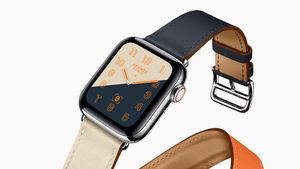JAKARTA - The latest update on the privacy policy of social media platform X, formerly known as Twitter, allows the company to collect biometric data and user DNA. The update was carried out without much attention and gave the platform permission to collect fingerprints, retinal scans, voice and facial recognition, as well as userken patterns.
This update means that anyone who uses fingerprint verification to log in to apps from their phone, uploads selfies or videos to the platform, or talks through the'spaces' feature on this platform, can have their unique biometric data recorded by the company.
This new privacy policy, which describes the platform's interest in user biometric data as a "security and identification goal," also adds the platform's intention to collect job history data, educational backgrounds, and user's "work search activity".
The move follows nearly a year of turmoil for this microblogging app, which includes Musk's request for users to pay subscription fees for premium services and verification: part of his larger plans to recover from a sharp decline in ad revenue.
For more than a decade, Big Tech companies have created controversy and have worried privacy advocates about their persistent interest in collecting their customers' biometric data.
For example, the viral video phenomenon from China, TikTok, has given itself permission to collect user's "face and voice traces" with a privacy policy update in 2021.
This summer, Meta, Facebook's parent company, announced its intention to eventually stop its facial recognition system, which has automatically identified users, as well as their friends and family, in photos for more than a decade.
SEE ALSO:
Jerome Pesenti, Vice President of AI Research Meta, said that this step was a response to "many concerns about the place of facial recognition technology in society."
While it remains unclear what Musk or platform X will do with user biometric data, Musk has spoken out about his desire to clear the site of its authentic and bot accounts since he bought the company last year.
In a move that might provide clues to Musk's future plans to collect and leverage user biometric data, the billionaire announced, via posting on X, that users will soon be able to make video and audio calls via X itself.
"No need for a phone number," Musk said, following previous comments that the platform would allow users to hide their phone numbers from other parties receiving calls. "X is an effective global address book."
Ongoing litigation may be another factor affecting the company's privacy policy update. A class action lawsuit, filed in Cook County, Illinois on July 11 this year, accused X ('X Corp.') of having miscatCHed, stored, and used Illinois citizen biometric data without their consent.
Musk's company, the claims, "does not provide adequate information to individuals who have interacted consciously or unconsciously with Twitter, that it collects and/or stores their biometric identities in every uploaded photo."
The case relates to the platform's license and Microsoft's software use called PhotoDNA since around 2015 to oversee pornographic images and other inappropriate content uploaded to Twitter and now X.
The class action lawsuit filed a lawsuit of US$ 5000 (Rp75.5 million) "for any reckless violation of the BIPA [Biometric Information Privacy Act of the Illinois state]" as well as demands issued by the court to force X to store user biometric data in accordance with Illinois state laws.
The English, Chinese, Japanese, Arabic, and French versions are automatically generated by the AI. So there may still be inaccuracies in translating, please always see Indonesian as our main language. (system supported by DigitalSiber.id)


















